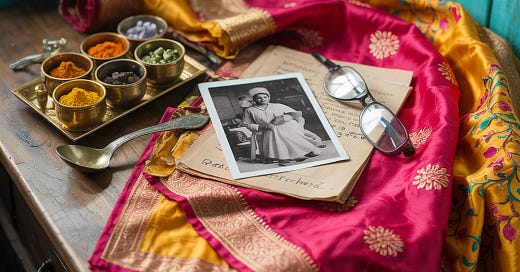Some food writers begin with their grandmother.
I suppose I do too. But for me, food isn’t the end of the story — it’s the way in. A portal. A way to trace the contours of exile, adaptation, and love.
Some of my earliest memories are of summers in Hendon, in my grandmother Ruby’s kitchen. My brother and I had been sent from Israel to London every summer, and our days revolved around BBC dramas, laughter with my cousin Sally, and the deep anticipation of lunch. The kitchen was its own world — a place where food wasn’t just sustenance, but a rhythm, a language, a thread that bound us to something larger than ourselves.
Granny Ruby hadn’t always been a cook. Born in Calcutta, in the heart of the Baghdadi Jewish community, she was raised as a proud and resilient woman in a privileged merchant-class, 'almost British' Jewish family. But life had other plans. When she arrived in England in the early 1950s, the comforts of her youth gave way to necessity. Cooking became both a skill and a lifeline — and she mastered it so well that soon, the entire Baghdadi Jewish community in London turned to her, placing orders for the foods they longed for at tea parties — the flavors of a world left behind.
She was no stranger to adaptation. One of my favorite stories about her — a tale that may be part truth, part family legend (Se non è vero, è molto ben trovato. — Giordano Bruno)— takes place in a Marks & Spencer in London, where she encountered an escalator for the first time. Dressed in a sari, she sat on the steps, unsure of what to expect. The fabric caught in the mechanism, twisting her around in an almost choreographed whirl until, by the time she reached the top, she was left standing in her underwear — flustered, embarrassed, but no less proud.
It’s an image that stays with me.
Not because it’s funny — though it is, as much as it was embarrassing — but because it captures what she never said: she was brave. She learned a new system, a new country, a new way to feed her family — all without losing the poise that had been woven into her upbringing.
It was from her that I first learned to love this food. The dishes she made — steeped in the spices of colonial British India, yet shaped by the kitchens of exile — were more than just meals. They were memory, survival, and adaptation on a plate.
And though she may not have considered herself a “cook” in the romantic sense — I don’t know if she even loved cooking — she became a keeper of the flame. And I see myself as the one she passed that torch to.
Enter another woman into my story: my mother.
Born in Germany, a Holocaust survivor, she came from a 700-year lineage of aristocratic rabbis, cold elegant cuisine, and a deep, tragic rupture. She was fascinated by my father — this Indian-looking Jewish soldier in a British uniform — while he was stationed in post-war Germany. He reminded her, she later said, of the red-bereted soldiers who patrolled the streets of British Mandate Palestine. Their match was as improbable as it was real.
She didn’t know curry from chutney. Coriander tasted strange to her.
But she adapted. She learned.
Not because she adored the food — she didn’t, at least not at first. But because she wanted to understand my father’s world. Just like she learned bridge to be part of his foursome, she learned to cook Indian Jewish food to build a common life with him. And, as with most things she put her mind to, she mastered it. Quietly. With care. And eventually, she, too, became a keeper of the flame.
So no, this isn’t just nostalgia.
I’m not romanticizing the kitchen or leaning on cliché.
I’m telling this story because these women made sure I had one to tell.
And now, I carry the torch.
But I carry it differently. I reserve the right to tweak and adapt — to modernize, reinterpret, and reimagine these recipes — not to break with tradition, but to extend it forward, so that it doesn’t disappear in generations who never knew India, or Granny, or the stories behind what simmered on the stove.
And here’s an unexpected twist: I recently discovered, through a passing reference in Dianne Jacob’s Will Write for Food, that she and I share the same heritage. Her mother, like my grandmother, was an Iraqi Jew — one who also migrated across cultures and cuisines, struggling at first to make sense of Western food. Her essay was praised because it wasn’t about food traditions passed down. Mine, in contrast, circles back to those foods before migration — trying to recreate and preserve them for a generation that barely knows they existed.
I guess that’s the difference.
My grandmother and my mother weren’t my muses, in the classical sense.
They were my anchors.
And I? I’m not just documenting recipes.
I’m trying to keep a world alive.
I cook the recipes written for me. And I tell the stories behind them.
#BeyondBabylon #FamilyMemoir #BaghdadiJews #IndianJewishCuisine #FoodHistory #DiasporaVoices #KeeperOfTheFlame





Thank you for the reference to my book on food writing, Elli, and my award-winning essay. Both my parents were Iraqi Jews whose families passed through Bombay on the way to Shanghai, where they were born. Here is the essay, in case you or anyone wants to read it: https://web.archive.org/web/20170702004942/http://luckypeach.com/the-meaning-of-mangoes/